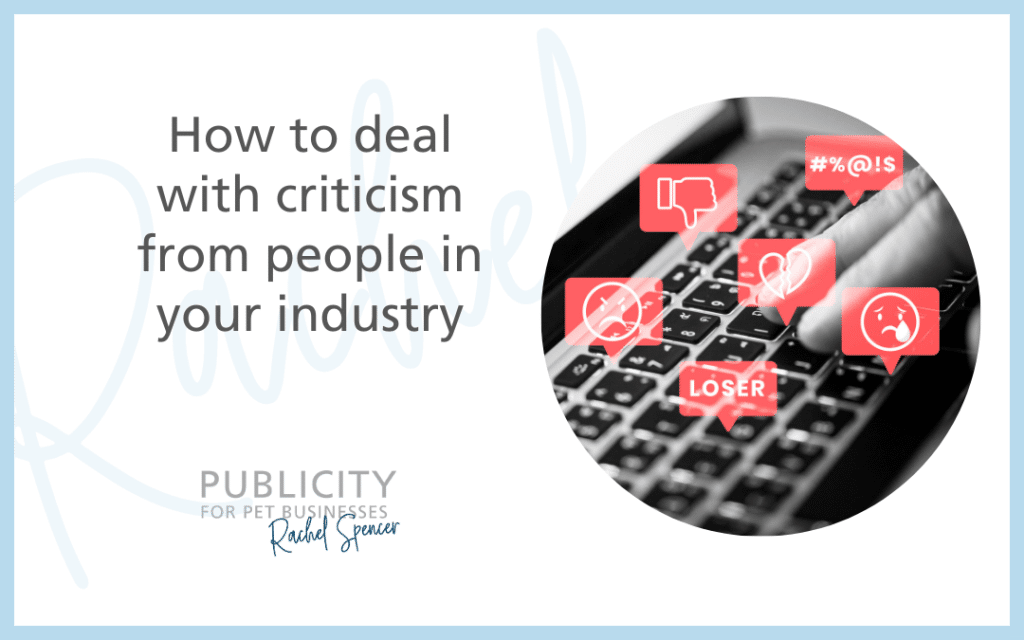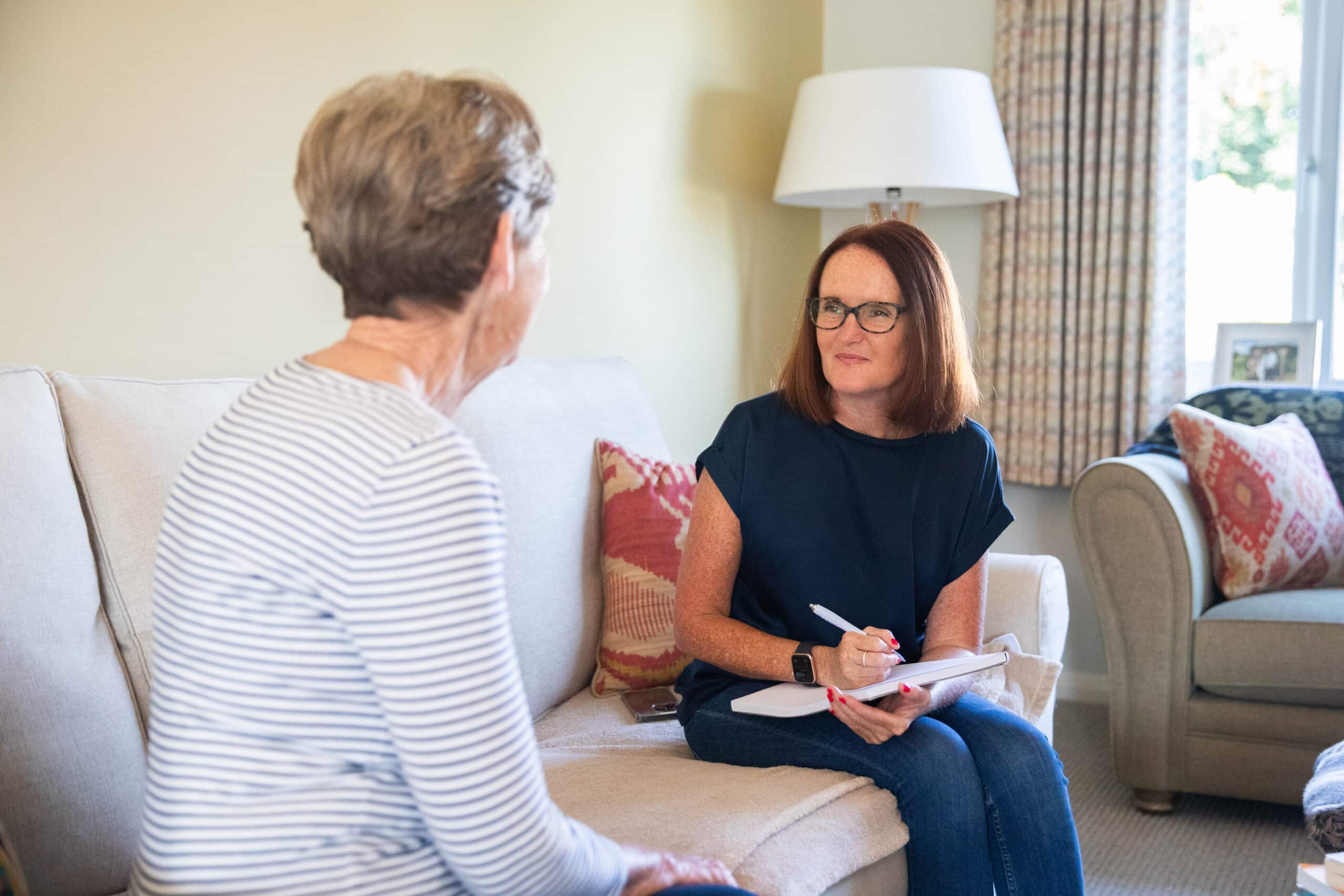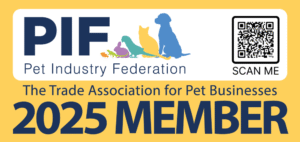Have you ever posted something on your website or on social media only to be met with catty remarks from your peers?
Maybe you’ve shared some advice for the customers or community you serve only to be torn apart by a competitor.
Putting yourself out there, and putting your content out there, is brave.
We are vulnerable, because although we come from a place of trying to be helpful, there is that fear that someone will tear us down.
I’ve seen so much of this recently that in my coaching community we have a stock answer – It’s not for you.
And while you might want to sugar coat it and perhaps be more polite, this is the key thing remember.
When our fellow professionals have a pop at our content, we need to stop and think ‘It’s not for you.’
Instead, think of who the content is for, and move on.
I know this is easier said than done, and in this episode, I’m going to share advice on how to deal with criticism.
You can listen in on the player link below or continue reading the key points as a blog post.
Who experiences criticism from peers
Well, pretty much everyone. When we put our head above the parapet we become a target for snipes and sneers.
When this happens it wakes up what my friend Rosie Gilderthorp describes as our Imposter Syndrome Imp.
You can listen to her podcast on Imposter Syndrome here.
The ‘Imp’ leads us to believe the criticism, to think ‘Who am I to say this?’ ‘Who do I think I am?’ ‘I’m not an expert’ and ‘I’m about to be found out.’
Of course, this isn’t true, but you would struggle to meet a single person who doesn’t have an ‘Imp’ and who can’t relate.
I’ve experienced criticism myself, and my clients who are pet professionals can relate.
So whether you’re a pet sitter, dog walker, dog trainer, behaviourist, groomer, photographer, Canicross instructor, hydrotherapy pool owner, massage therapist, product maker, directory owner, you may have experienced it too.
Case study – Ali Smith
Ali Smith, founder of online puppy training website Rebarkable.com, says this: “My experience is often with my blog which is aimed at new puppy parents – aka – the greenest members of the canine community.
“This means I have to take a very easy tone, make things digestible and simplify as much as possible.
“Other trainers have given me quite a lot of feedback about the ‘lack of professionalism’ in my blog, because I do take such a casual tone when explaining things.
“They tell me that I, ‘don’t present myself as an industry expert should,’ or that I’m just plain wrong because our methodologies didn’t agree.
“It used to get to me, and I wondered about changing it up, even though I was seeing my ideal client approaching me more and more often, until I realised that the content was not for the trainers.
“That whilst they’re my peers and colleagues (if only virtually) and great for ideas at times, they’re not so well suited for feedback on my content…
“Then I began to respond with things like, ‘Thanks for your input,’ because I find that most often I have more business sense than these people.
“That simple statement makes them feel heard, and doesn’t allow them ways to re-engage and frustrate me further.”
Why people feel the need to lash out
There’s a saying that goes, ‘Blowing out someone else’s candles doesn’t make yours burn any brighter.’
While people might feel that putting others down makes them look more knowledgeable, most folk see through this.
My feeling is that people do this for a few reasons.
- They have too much time on their hands.
- They don’t create their own content and consume other peoples’.
- They wish they had the courage to put themselves out there and share their expert knowledge.
- Sometimes, they’re just being mean.
So if someone is laying into you, bear this in mind.
What’s the impact?
When we feel like we’re being attacked or our expertise is being questioned, that we’re being called out online, we retreat.
It’s likely if you’ve experienced this, you’ve put you, your knowledge and your expertise out there with good intentions.
Let’s say like Ali you’ve written a guide to welcoming a new puppy. Your drive is to provide support to owners who might be feeling uncertain.
But if other dog trainers lay into you and question what you’ve said, it’s natural to question yourself and want to hide away.
A few months ago I had an exchange with someone who took exception to me charging for Power Hours to write press releases and give other support around publicity.
At the time, I was promoting an offer but the experience made me question my pricing and what I should be charging. Was I ripping people off?
And even though I offer so much for free, from templates where I lay out exactly how to write a press release and explain this in a podcast, to pitching guides, to free challenges that has led to hundreds of people securing media coverage, I felt awful.
I stopped sharing the offer and retreated from being active online.
So the impact of being put down online can be the following:
- You feel like you’ve been ‘found out,’ and imposter syndrome takes over.
- You question yourself, your knowledge and experience.
- You feel anxious online so you hide from the internet.
- You don’t reach the pet owners who may need your help.
The final point is really important. If we take Ali’s example with the puppy blog. She has had loads of people tell her how useful her content has been.
They’ve found it and she’s given them the answers and solutions they were searching for.
What might have happened if they hadn’t? What if they turned to a trainer who wasn’t force free?
I know this might sound a bit dramatic but it’s like a sliding doors moment isn’t it?
Imposter syndrome doesn’t just impact on us, it can impact on the people who need our support too.
And ‘The Imp’ as Rosie calls it is with us no matter what stage we’re at.
Former journalist and digital marketing expert Natasha Courtenay Smith is someone who I have looked up to for many years posted on LinkedIn about experiencing it.
She said: “I’ve launched and scaled 3+ businesses. And every time I do, I think I’m going to be ‘found out’.
“That my previous experience – and skills mean nothing. Imposter syndrome is real.
“And NO one is immune. But what I’ve realised is almost ALL of us feel this way.
“And so, feeling like an imposter for a moment doesn’t mean you’re an imposter in life.
“Agree?”
What can we do?
Keep going. It is so hard and sometimes if you’re feeling bruised then it’s ok to take a bit of time out (as I did).
But come back to it, get back on the horse, because ‘It’s not for them.’ It’s for the people who need your help.
One of my clients Kim O’Donnell from Leo, Charley and Me has an anxious dog Leo who was attacked twice by other dogs as a pup.
She has tried so many things to help him and she’s now being supported by a brilliant dog trainer, Claire Lawrence from High Peak Dogs who has been on the podcast before.
Claire supports owners of barking, reactive dogs. She has such a lovely, warm way about her and Kim says she hangs on her every word.
Even though Claire think she’s just doing what she does when she writes her books or puts her podcasts and social media out there, the knowledge she shares is life changing for people like Kim and her other clients.
It’s hard, but try to be less self conscious and keep posting. What’s the worst that can happen? You can take it down.
You can stand up to people too. Angela Day from Born2Run is a canine massage therapist and had a peer post a catty remark when she shared some of her press coverage.
Angela replied and said: “Do I detect some professional jealousy?” The other therapist left her alone.
Ali has felt bruised, but she’s now got her staple response which is: “Thank you for your feedback.”
You could simply say: “It’s not for you, it’s for new puppy owners/barking dog owners/anxious cat owners,” or whichever applies to you.
The criticism and nasty stuff we get online feels ten times louder than the positive comments and messages.
Be careful who you look up to
Do they share your values and big you up when you need it?
Do you feel like they have your best interests at heart?
Surround yourself with people who get what you do and will give you support, and will want to lift you up when you feel low.
Finally, my favourite thing is to keep a physical win folder and I suggest all my clients do the same.
Inside mine are thank you cards, print outs of e mails, social media messages and comments from people who have taken the time to be lovely.
Seek out those people and try not to let the negative Nellies drown out the good stuff.
Do you have any coping strategies for when people have a pop at you.
If you’d like support with your mindset and visibility and be part of a friendly community, come and join my Pets Get Visible membership where you can get started for just £30 a month.
Check out Is my Pets Get Visible membership right for you?
I would love to hear your suggestions. Let me know in the comments or on social media @rachelspenceruk on all platforms.
If you enjoyed this podcast, you might like to listen to How to create a positive mindset with Sarah Baxter or How to create content if you’re not a confident writer














